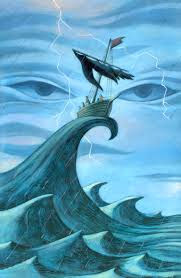Social-Learning Theory in Ishmael
- The Tempest
- Apr 9, 2016
- 3 min read

Although most literary criticism has been tested and given merit over time, there is little to be said of applying a sociological theory to literature. However, after reading almost two-thirds of the novel, one could argue that Ishmael, while having much internal discourse about the nature of whaling and the events that he partakes in, he fails to subjectively take action against events that seem morally, socially, and naturally questionable. The nature in which Ishmael participates in the events is all a bit nebulous, and it is difficult to determine how he feels about the morally questionable behavior. Given his seemingly Christian background, much of his actions seem contradictory to this and this scholar conjectures that the explanation for his actions lies in his adaptive response behavior similar to Albert Bandura's social learning theory. Social learning theory conjectures that a behavior is engaged in and "leaned through cognitive interaction with a social structure that produces a behavior" (Bandura 1963). There are many behaviors that Ishmael "learns" throughout the novel and one could make a strong argument that his character is a great example of social learning theory.
In chapter three, we learn that Ishmael decides to bed with Queequeg, when Queequeg boldly throws the sheets back and says, "You gette in" (Melville 26). Ironically, the homo-eroticism of this scene contrasts greatly with the information Ishmael states in chapter ten when he says that he "was a good Christian" (Melville 58). Clearly sleeping in bed with another man would clearly be in direct contradiction with Christian morals. The argument that is being made here is not a moral one, but this example illustrates the contradiction in Ishmael's faith and the decisions that he makes. The question then remains, why he would do such a thing? The reason lies in Bandura's learning theory. When Ishmael is put into a cognitive interaction with Queequeg, a homosexual behavior (albeit an implied one) is produced.
Another example of learning theory can be found when Ishmael and Queequeg eat the chowder at Try-Pots in chapter fifteen. Queequeg and Ishmael are at a table eating quietly when several sailors enter and we see a woman "carrying on a brisk scolding with a man in a purple woollen shirt" (Melville 73). It is clear the patrons of this tavern are rough around the edges, and profane and vile discourse are quite common. Ishmael, to this point, has been very polite and reserved. However, Ishmael shows an example of learning theory again when he treats the tavern woman with mild contempt as he rudely bosses her around at the end of the chapter when he demands to the proprietor that he will have "Both, and let's have a smoked herring by way of variety" (Melville 75). In this instance, he has learned that it is acceptable to treat the proprietor with disrespect like the other patrons have done.
More important examples of Ishmael's learned behavior play out while on the Pequod with Ahab and the crew. In chapter forty-one we learn of Ahab's selfish and delusional reasons for hunting Moby Dick as "With greedy ears I (Ishmael) learned the history of that murderous monster against whom I and all the others had taken our oaths of violence and revenge" (Melville 194). This is perhaps the strongest example of learning theory in the text. Although Ishmael is on the ship, he has no previous encounters with Moby Dick, has not had a physically traumatic experience with the fish (like getting a leg bitten off), and therefore, really has no legitimate reason to hate the whale and seek revenge on it. He has learned this ideology from the crew; particularly learned from the obsessively destructive Ahab. He later reinforces this learned behavior by reading a book that describes the sperm whale "to be a consternation to every other creature in the sea" (Melville 196). He later doubles down on this learned hatred at the end of chapter forty-one when he states that he "could see naught in that brute but the deadliest ill" (Melville 203). Again, he has had no interaction with the whale up to this point and yet he regards it with such contempt. The only explanation is that he has taken upon himself the thoughts and actions of his crew members, and in that sense his behavior is a classic example of learning theory.
Although Bandura's work was published hundreds of years after the publishing of Moby Dick, his theory goes a long way in serving as a possible angle of criticism and inquiry into the behaviors of Ishmael through the first half of the book. While not widely accepted as a form of literary criticism, the theory serves as an interesting critique of Ishmael and the decisions that he makes.
Bandura, Albert. Social Learning and Personality Development. New York: Holt, Rinehart, and Winston, 1963.
Melville, Herman. Moby Dick. 1851. London: Penguin, 2003.






Comments